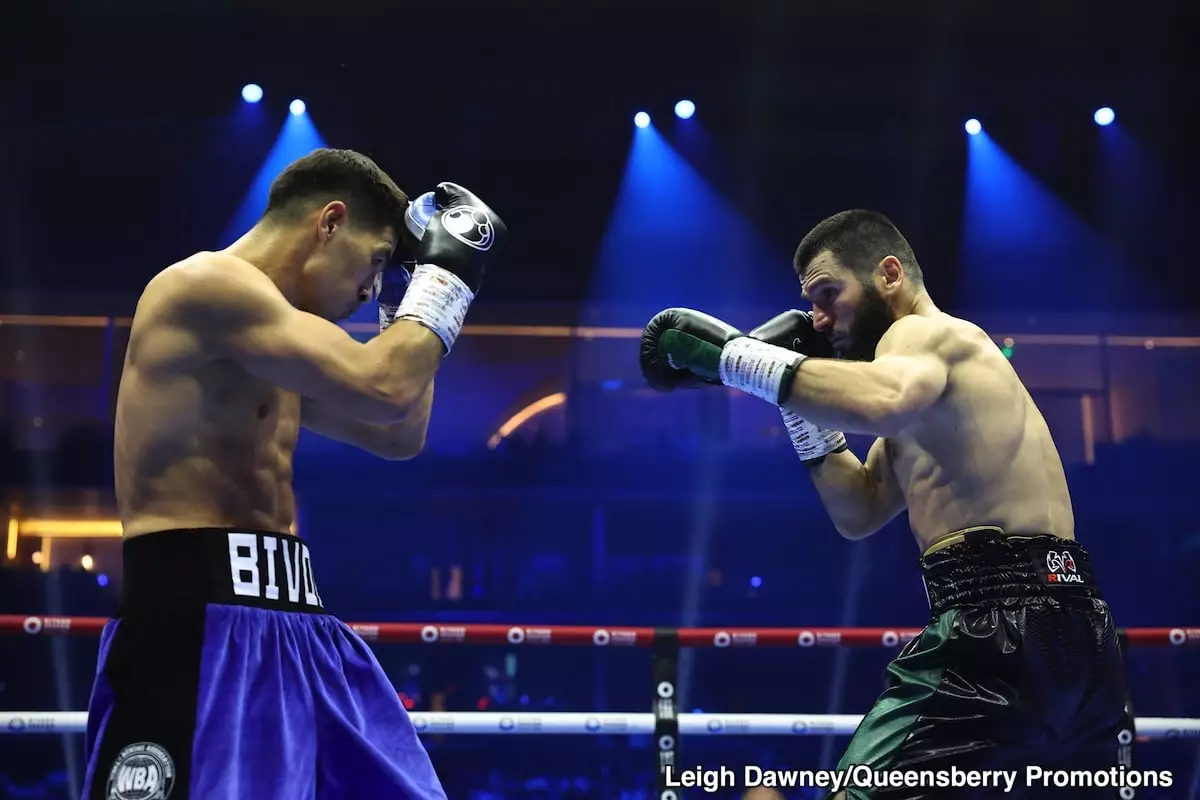After a hard-fought battle on October 12th, Dmitry Bivol’s majority decision loss to Artur Beterbiev at the Kingdom Arena in Riyadh has sparked significant controversy within the boxing community. In the aftermath of the bout, Bivol’s team has chosen to file a protest with the four major boxing governing bodies. Their objective? To secure an immediate rematch with Beterbiev, whom they assert was rightfully defeated based on public sentiment. However, this protest not only raises questions about the state of sportsmanship in boxing but also illustrates the challenging dynamics of interpreting victory in the ring.
Bivol claims that “the majority of viewers” perceived him as the true victor of the match; a statement that, unfortunately, lacks substantial evidence. The idea that electoral sentiment can serve as a basis for protest is questionable at best. Viewer opinions, while they may provide an emotional backdrop, do not possess the concrete evidence needed to overturn a verdict rendered by professional judges. This situation calls into question the effectiveness of public opinion as an argument in the professional realm of boxing, despite its potential to resonate with fans.
Moreover, one must consider the intent behind filing such a protest. A rematch could be a financially beneficial option for Beterbiev, assuming that other lucrative challengers such as Canelo Alvarez or David Benavidez are unavailable. Yet, the cynical side of this protest implies a lack of maturity on Bivol’s part—or at least presents him as a losing fighter reluctant to acknowledge a setback. This contrasts sharply with the sportsmanship that boxing, as a history-rich sport, has long espoused.
Ultimately, the bout between Bivol and Beterbiev highlighted a fundamental imbalance in fighting styles. As noted by boxing commentator Gareth A. Davies, Bivol struggled to maintain his footing against Beterbiev’s relentless approach, particularly in rounds eight through twelve. Critics argue that Bivol’s evasive style overshadowed his ability to mount an effective offense after being stunned in the seventh round; many fans were eager to witness an agile fighter rise to the occasion rather than retreat.
In hindsight, a closer examination of the fight suggests that while Bivol exhibited commendable defensive skills, he failed to respond effectively when Beterbiev began to assert dominance. The term “bullied” aptly captures Bivol’s predicament in the latter half of the fight, where he appeared overwhelmed by Beterbiev’s power and persistence. The pressing question remains: could Bivol have adopted a more aggressive approach? The reality is that fear of being knocked out often compels fighters to retreat, resulting in a lackluster performance that frustrates fans and pundits alike.
By filing a protest, Bivol’s team likely hoped to leverage the attention garnered from the bout to revitalize his reputation among hardcore boxing fans. However, such strategies can backfire, drawing unfavorable comparisons between him and other fighters notorious for their reluctance to acknowledge defeats. This could further isolate him from casual fans who value humility in sportsmanship. Additionally, invoking parallels to historic fights—such as Lennox Lewis versus Evander Holyfield I—potentially trivializes Bivol’s circumstance; that incident occurred in a different context and carries its own historical significance.
Furthermore, Bivol’s protest reflects a broader challenge within boxing: how do fighters cope with the psychological ramifications of defeat? In a sport that places a premium on performance and glory, many champions find themselves wrestling with their identities when faced with loss. Thus, while the protest may be a strategic move to call for a rematch, it also raises questions about resiliency and personal growth in the face of adversity.
Looking ahead, should the rematch between Bivol and Beterbiev take place, it will be crucial to reconsider not just the fight strategies, but also the environment in which these boxers compete. Suggestions to limit Bivol’s running room through a smaller ring could make for a more engaging contest, allowing Beterbiev’s raw power to be highlighted while challenging Bivol to adapt. Fans will undoubtedly want to see both fighters step up their games and refuse to leave any subjective opinion on the table.
Ultimately, this situation serves as a reminder of the complex interplay between performance, public perception, and the pursuit of redemption in professional sports. For Bivol, this protest may offer a temporary distraction, but the only true validation comes from the ring itself, where actions speak louder than opinions. Only time will tell if he can better assert himself in his next bout, transforming lessons learned from this experience into something unequivocally victorious.


Leave a Reply